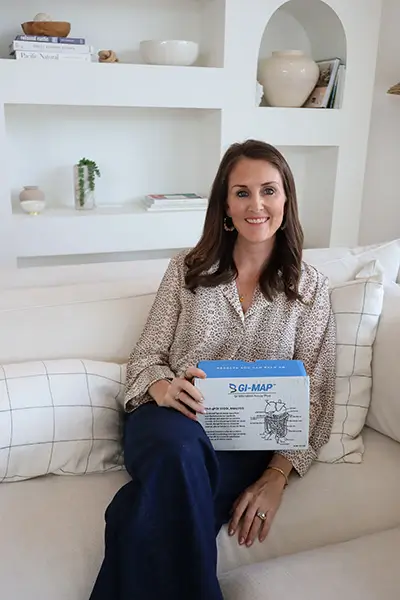Hair loss can be one of the most frustrating and visible symptoms of thyroid issues. Whether it’s hypothyroidism, Hashimoto’s, or even subclinical thyroid dysfunction, thinning hair often comes alongside fatigue, bloating, constipation, and other symptoms that make you feel unlike yourself.
Many people assume that medication alone will fix the problem, only to find that their hair continues to shed. Understanding why this happens and what your body really needs can help you take steps toward stronger hair growth and better overall health.
Why Hair Loss Happens with Thyroid Issues
Your thyroid hormones are essential for keeping your hair growth cycle healthy. Both hypothyroidism and Hashimoto’s can slow the rate at which your hair grows and even cause it to shed prematurely. The active thyroid hormone, T3, plays a big role in nourishing hair follicles and keeping them in a growth phase. If your body is not making enough T3, your hair growth slows, and more strands shift into a resting phase, eventually falling out.
This is where testing matters. You can still experience hair loss even if your TSH and T4 look normal on standard labs.
Many routine thyroid panels skip important markers like free T3 and thyroid antibodies, both of which can reveal deeper issues. Low free T3 can signal that your body isn’t converting enough of the storage hormone T4 into active T3. High antibodies can indicate Hashimoto’s, where your immune system is attacking your thyroid and causing hormone fluctuations. Without these tests, it’s easy for hair loss to be brushed off or misattributed to stress or aging.
The Mineral–Thyroid–Hair Connection
Hair growth isn’t just about what’s happening on your scalp. It’s about the overall health of your thyroid, liver, gut, and stress response. These systems rely heavily on specific minerals for thyroid hormone production and conversion, which directly impacts your hair’s ability to grow and stay healthy.
Even with medication, if your minerals are out of balance, your body can struggle to produce and use active thyroid hormones, leading to ongoing hair loss.
Potassium: The Energy and Conversion Mineral
Potassium is essential for converting T4 into the active hormone T3. Without enough potassium, your body can produce thyroid hormones but fail to use them effectively, which slows your metabolism and can weaken hair growth. Stress is one of the biggest potassium drains, whether it’s mental, physical, or from past illness or pregnancy.
Most people fall short of their potassium needs, which impacts not only their thyroid but also blood sugar, energy, and muscle function. Adding potassium-rich foods like bananas, avocados, sweet potatoes, leafy greens, tomatoes, and coconut water to your meals can make a noticeable difference.
Selenium: Protecting and Nourishing the Thyroid
Selenium acts as an antioxidant for the thyroid, reducing inflammation and helping convert T4 to T3. This is especially important in Hashimoto’s, where research shows selenium can help lower thyroid antibodies and calm immune activity. Lower inflammation means better hormone balance, which helps support healthy hair follicles.
An easy way to get selenium is by eating two to three Brazil nuts a day. You can also find it in fish, eggs, and mushrooms.
Copper and Zinc Balance
Copper plays a role in T4 to T3 conversion and in iron metabolism, which is essential for hair health. But copper works best in balance with zinc. Too much copper or too little zinc can lead to hormonal imbalances, poor thyroid function, and increased hair shedding.
Imbalances can be caused by stress, certain birth control methods like copper IUDs, or even multivitamins that don’t have the right ratios. Foods like shellfish, legumes, nuts, and seeds can help restore balance, but testing is the best way to see what your body really needs.
Iodine: Use with Caution in Hashimoto’s
Iodine is necessary for producing thyroid hormones, but it’s a tricky mineral for those with Hashimoto’s. Too much can trigger an immune flare and worsen symptoms like hair loss. Getting iodine from food sources like kelp, nori, and other sea vegetables a few times a week is often a safer approach than high-dose supplements.
B12, Cobalt, and Iron
B12 helps with energy production, nerve health, and red blood cell formation, all of which are important for healthy hair growth. Cobalt is a component of B12, so without it, your body can’t use B12 effectively. Both are most abundant in animal-based foods like meat, poultry, fish, dairy, and eggs. Iron is another essential mineral for both thyroid hormone conversion and hair growth.
Low iron can slow the conversion of T4 to T3, while thyroid issues can contribute to low iron levels. Pairing iron-rich foods like red meat, lentils, and spinach with vitamin C can help improve absorption.
Real-Life Results: When Minerals Make the Difference
One client came to us exhausted, shedding hair by the handful, and struggling with blood sugar crashes and constipation, despite finally sleeping through the night as a 18 month postpartum mom. She was convinced hormones were to blame, but HTMA testing revealed deep mineral depletion, especially low magnesium, potassium, sodium, and iron, along with ratios showing sluggish thyroid function.
By focusing on the right vitamins and minerals for hair loss and supporting her digestion, she experienced big changes in just three months. Her energy returned, her bowel movements became regular for the first time in years, and her hairdresser even noticed all the new growth.
Restoring minerals doesn’t just help hair, it supports the entire body.
Your Next Steps for Stopping Thyroid-Related Hair Loss
If you’re losing hair and suspect your thyroid is involved, start by requesting a comprehensive thyroid panel that includes TSH, free T3, free T4, and antibodies. In addition to optimizing your medication, emphasize a mineral-rich diet which can can improve hormone conversion, reduce inflammation, and support stronger hair growth.
For more tips, recipes, and practical steps, download our free mineral guide for links, resources and recipes to get started supporting your minerals. If you are ready for answers, consider HTMA testing to identify hidden mineral deficiencies that are contributing to your symptoms and gain clarity on the specific action steps you need to take.








